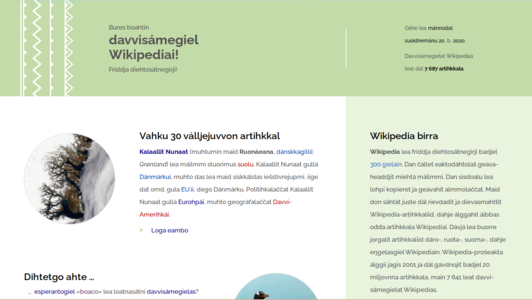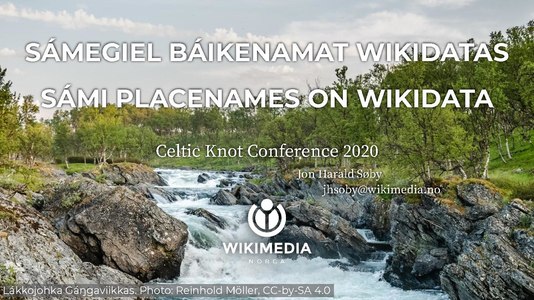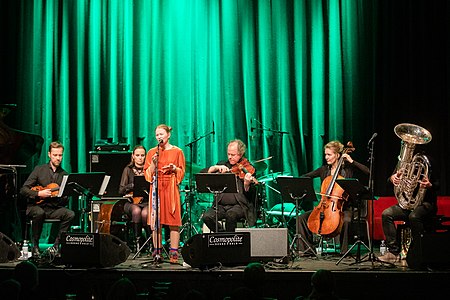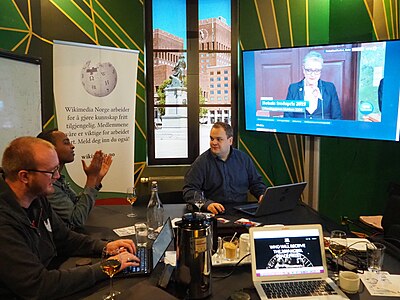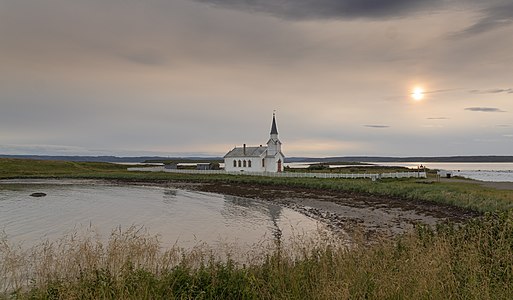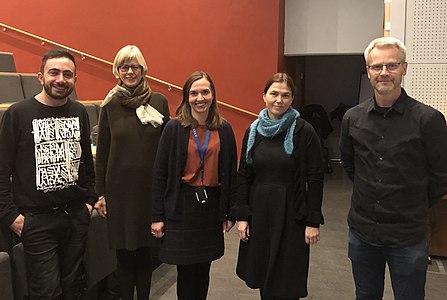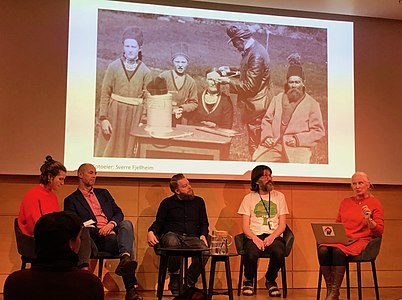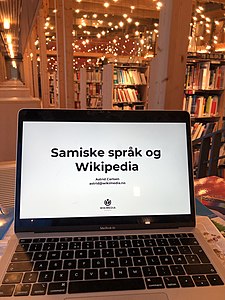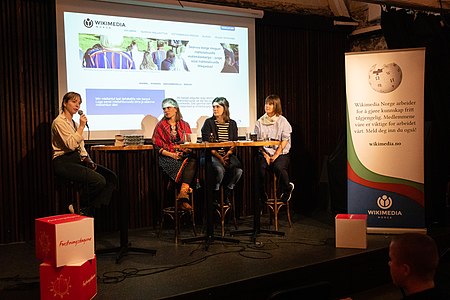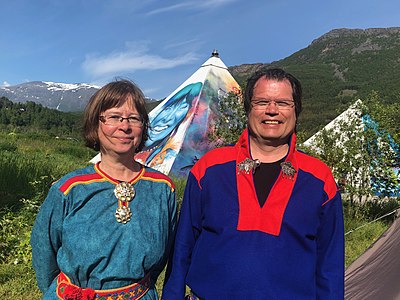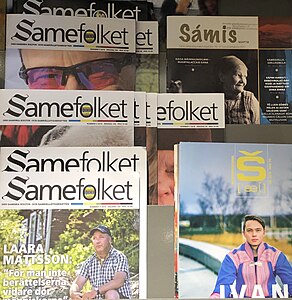Grants:APG/Proposals/2018-2019 round 2/Wikimedia Norge/Impact report form
Purpose of the report
[edit]This form is for organizations receiving Annual Plan Grants to report on their results to date. For progress reports, the time period for this report will the first 6 months of each grant (e.g. 1 January - 30 June of the current year). For impact reports, the time period for this report will be the full 12 months of this grant, including the period already reported on in the progress report (e.g. 1 January - 31 December of the current year). This form includes four sections, addressing global metrics, program stories, financial information, and compliance. Please contact APG/FDC staff if you have questions about this form, or concerns submitting it by the deadline. After submitting the form, organizations will also meet with APG staff to discuss their progress.
Global metrics overview - all programs
[edit]We are trying to understand the overall outcomes of the work being funded across our grantees' programs. Please use the table below to let us know how your programs contributed to the Global Metrics. We understand not all Global Metrics will be relevant for all programs, so feel free to put "0" where necessary. For each program include the following table and
- Next to each required metric, list the outcome achieved for all of your programs included in your proposal.
- Where necessary, explain the context behind your outcome.
- In addition to the Global Metrics as measures of success for your programs, there is another table format in which you may report on any OTHER relevant measures of your programs success
For more information and a sample, see Global Metrics.
Overall
[edit]Explanation of grantee defined metrics:
- Diversity: Number of new or improved articles on women's biographies on the Norwegian Bokmål, Norwegian Nynorsk or Northern Sámi Wikipedias and number of Sámi-related items added to Wikidata. Starting with this progress report we are also including images upladed to Wikimedia Commons and pages added to Wikisource during as part of our two projects on Sámi knowledge and Women in Red.
- Community hours: Hours community members spend on organizing activities or helping staff organize activities (not included are hours spend adding content)
| Participants | Newly registered | Content pages | Diversity | Volunteer hours | |
|---|---|---|---|---|---|
| Program 1 Community Support | Target this year: 500 Impact: 16,773 (this includes the reach of WikiTongues YouTubevideo) |
Target this year: 50 Impact: 66 |
Target this year: 10,000 Impact: 19,250 |
Target this year: 5,000 Impact: 6,750 |
Target this year: 600 Impact: 470 |
| Program 2 Content | Target this year: 500 Impact: 355 |
Target this year: 200 Impact: 105 |
Target this year: 10,000 Impact: 3,100 |
Target this year: 10,000 Impact: 28,390 |
Target this year: 500 Impact: 420 |
| Program 3 Free Knowledge | Target this year: 400 Impact: 90 |
Target this year: 20 Impact: 5 |
Target this year: 2,000 Impact: 4,600 |
Target this year: 100 Impact: 80 | |
| TOTAL FOR ALL PROGRAMMES | Target this year: 1,400 Impact: 17,218 |
Target this year: 270 Impact: 176 |
Target this year: 20,000 Impact: 22,350 |
Target this year: 17,000 Impact: 39,740 |
Target this year: 1,200 Impact: 970 |
Comments on metrics:
We very much welcomed the grantee defined metrics when they were introduced for the 2016–2017 funding period. Both metrics Wikimedia Norge decided on, diversity and community hours, have increased over the past three years. The development for the grantee defined metric Diversity for the period July–June is:
- July 2017–June 2018: 21,836
- July 2018–June 2019: 15,030
- July 2019–June 2020: 39,740
We expect a continued increase for the Diversity metric, as much of our work and collaborations will be on Wikidata and Wikimedia Commons the next years. We would like to add that in the work for knowledge equity, a high number alone is not necessarily a sign of a successful project or collaboration. The transcription and translation of 30 letters from Norwegian to English to Armenian documenting the Armenian genocide by a Norwegian nurse and missionary, Bodil Biørn (project page), is an example of a year-long project, making unique archive material written by a women available on Wikisource. The project has also received national funding.
Due to COVID-19 and cancelled physical events from March 2019 till the end of this funding year in June 2019, the numbers on Newly registered and Community hours are a bit lower than what we expected.
Telling your program stories - all programs
[edit]Impact of Wikimedia Norge’s work funding period 2019–2020
-
A new Northern Sámi Wikipedia front page was designed during spring 2020
-
Wikimedia Norge's diversity manager Åsa Paaske Gulbrandsen (left) left Wikimedia Norge in August and was replaced with Mali K. Brødreskift (right)
-
Wikimedia Norge presentation on Sámi place names during the fully remote Celtic Knot Conference summer 2020
Wikimedia Norge's programs: impact, changes and the future
Wikimedia Norge has worked on 3 programs this last year. All three programs have been part of our work for several years and have a strong focus on a selected group of partnerships and a set of activities and events we do on an annual basis. All the programs have diversity as an overarching theme:
- Program Supporting communities
- Program Closing content gaps
- Program Raising awareness of free, trusted knowledge
As for everyone else the past 6 months have turned a lot of things upside down for Wikimedia Norge. It has affected our programs in terms of planned events, meetings and travels, and impact in terms of for example Newly registered. It has also affected funders and resources our partners have available for collaborations with Wikimedia Norge. However, also new opportunities have presented themselves. We have been pushed to find and test new digital ways to do our work, rethinking funding opportunities and a lockdown situation freed time to work on governance issues we normally could not prioritized, like documenting an on- and offboarding routine for staff and writing an environmental guideline for Wikimedia Norge. With a new world with no travels and few physical meetings we have spent a lot of thoughts the last 6 months on how Wikimedia Norge can still keep an international focus in our work and investigate new partnerships. We are very excited to partner with a great group for the Arctic Knot conference (conference grant application) we are planning for June 2021. A lot of our work in 2020–2021 will be centered around this conference.
The pandemic has been a test of how well our organization works in terms of internal and external communication and collaboration, how we can support community members, how dedicated our partners are to work with us under suddenly completely different circumstances and keeping motivation and progress under lockdown and from home offices for both staff and board members. It has helped us a lot during this time that the division of tasks are so well established between the board and the staff members. All our guidelines are listed on this page.
We have learned the last year that just moving in person events to a digital space does not necessarily work that well. We will prioritize to continue to experiment with digitally Wikipedia trainings as part of our education programs and we are excited for the upcoming year’s Arctic Art+Feminism editathons we will do together with Art+Feminism. Art+Feminism will be a partner we can learn a lot from when it comes to organize digital trainings. We will in the future only prioritize physical events when they happen in close collaboration with one or more of our partners, the event has a clearly programmatic overlap with one or more of our programs and the main impact will be to raise awareness, not on editors and content pages added.
All in all, our global metrics results have been affected by the pandemic, but not as much as we feared it would be 5–6 months ago. Most of the global metrics are on track. We predict that our metric for newly registered for the next few years will not be higher than this year. The metric for content pages goes down as the number of content pages for Diversity goes up. This shows the shift in our work is showing good results; partnerships with Glam institutions also all focus on underrepresented source material on the Wikimedia projects, from letter and image collections uploaded to Wikisource and Wikimedia Commons, to place names added to Wikidata.
Wikimedia Norge looks forward to implementing more of the 2030 strategy recommendations in our work. We do think that a lot of our work is already aligned with the strategy, but we wish to contribute to the global implementation of the strategy and the future state of the movement. Wikimedia Norge has gained a lot of experience during our Sámi project in different areas: tech, content, capacity and communication skills, and partnerships with cultural and educational institutions. We do think work to support minority and indigenous language editions on Wikipedia are very much in line with the 2030 recommendations, and it is an area Wikimedia Norge would like to structure and support on a regional level.
Wikimedia Norge’s revenues and spending are according to our budget. We feared a lot for future revenues during spring and summer 2020, but with reorganising our work and shifting focus in some projects we hope we have positioned ourselves to access national funding also for 2020–2021. Our long-term goal is to have our programs funded by national funders and cover the operating expenses by the APG funding from Wikimedia Foundation. One of the changes in revenue streams we think would be a great outcome of the 2030 strategy recommendations are multi-year Wikimedia funding options for both small and bigger Wikimedia affiliates. It would provide a lot more stability for affiliates.
For more detailed information about our work these links are useful:
- Strategy for Wikimedia Norge 2018–2022
- Annual plan for Wikimedia Norge 2019–2020
- Quarterly staff reports
- Quarterly spending’s reports
- Quarterly communications reports
Supporting Communities
This program will strength and support the work done by and the collaborations between a diversity of communities, partner organizations and Wikimedia Norge
-
Concert image uploaded to Wikimedia Commons by volunteer
-
Wikipedians and Wikimedia Norge staff at The Nobel Peace Centre during Wikinobel 2019
-
Image that was part of Wiki Loves Monuments 2019
Highlights
[edit]- During spring we worked on getting a new design for the Northern Sámi Wikipedia front page in collaboration with volunteers and a designer from the firm Arvu. We have shared to work on the design on the Wikimedia Norge blog and in a Wikimedia Diff blog post: “Wikipedia exists in more than 300 different languages, and every language edition has its own main page. The main pages can vary a lot between the different editions. However, there are a few things that recur for all large language editions: the design is mostly based around framed boxes, and has usually been unchanged for many, many years. (...) We wanted a more modern main page that was more user-friendly and also stood out from the other language editions, and at the same time had a Sámi theme, so we contacted Árvu. “Árvu” is Northern Sámi for “value”, and they have designed websites and other material for many companies and organizations in Northern Norway, and on their website they write that they wish to increase the value for Northern Norwegian and Sámi companies." Our goal is that the new design will be more welcoming for new editors.
- The series of Celtic Knot conferences organised by Wikimedia UK and in 2020 also Wikimedia Ireland have been a very important meeting place for learning for our Sámi project. We are very excited to plan for the 2021 edition of Celtic Knot in Norway, under the name Arctic Knot: A Wikimedia Languages Conference, with a great group of partners. The previous conferences have focused on sharing knowledge about different Celtic languages, the 2021 conference will focus on the Sámi indigenous languages spoken in Norway, Sweden, Finland and Russia. The Arctic Knot will focus on the minority and indigenous language community and how the Wikimedia projects can support the use and visibility of these languages. The organization of the conference will be a regional and global collaboration between different Wikimedia affiliates, both chapters and user groups. With the Arctic Knot conference and the diversity of conference partners Wikimedia Norge hopes to strengthen the future work of the wider Wikimedia community on support for peer to peer learning on smaller language Wikipedias and communities.
Impact
[edit]The goals we have been working on to achieve for the 2019–2020 funding period were:
- WMNO will be an organization that works together with a diverse set of communities and is considered an influential organization in free culture and open knowledge.
- WMNO will offer different types of support to new and active volunteers that enables contributions to the Wikimedia projects.
- WMNO will support different community initiatives and share volunteers' stories in social media.
Our communication plan is an important tool for us to reach our goal of becoming an influential organization in free culture and open knowledge. The different communication channels we use are: Our website, wiki, blog, newsletters, Facebook, Instagram, YouTube and Twitter.
We have a set of community support activities that we have organized over several years now. The community support activities are used and appreciated by both Wikimedia Norge members and other volunteers. Examples of different activities Wikimedia Norge offer to support community activities are wiki grants, The Wikipedia Library, online editing and photo contests like Wiki Loves Monuments, wiki meet-ups and Wikidata workshops, applying for press accreditations, sharing stories from volunteers and our work in different communication channels. As we increase the number of volunteers we give support in one way or the other, we have more volunteers we can encourage to get engaged in other projects as well.
During the last 6 months we have expanded The Wikipedia Library project with offering access to paywalled Sámi newspapers. Three volunteers signed up for access. With the pandemic there is of course not many press accreditations to apply for as most concerts and festivals have been cancelled. We have switched to digital wiki meet-ups and will probably continue with some of the wiki meet-ups being digital also when physical meetings are possible again. With digital meetings volunteers from anywhere can participate, and one can also participate more anonymously. The digital wiki meet-ups are organized by Wikimedia Norge, but volunteers suggest different topics for either trainings or discussions.
The Wikipedian of the Year was announced during our digital general essembly in March 2020. The Wikipedian of the Year is a long time contributor to the Northern Sámi Wikipedia, a bureaucrat on Northern Sámi Wikipedia and her contributions on this wiki is impressive. User:Yupik has been one of the key contributors to Wikimedia Norge's Sámi knowledge project and we look forward to a lot more collaboration in the future.
Lessons learned
[edit]- The level of conflicts increased a bit on Norwegian Bokmål Wikipedia this summer. This was discussed on wiki among volunteers, staff at Wikimedia Norge was contacted about it and thus it was on the agenda for the August board meeting of Wikimedia Norge. At the digital wiki meet-up October 1 2020 this was the topic of discussion. Some good ideas were suggested for volunteer collaboration and for how Wikimedia Norge can support the volunteer community better. We will continue the discussion on what Wikimedia Norge can do on the village pumps of the Norweagian Wikipedias to make sure more volunteers can share their opinion, also by sending email anonymously. We do want to include as many voices as possible and we also need to make sure Wikimedia Norge supports and facilities but not make decisions and changes that are up to the volunteer community. Both staff members and the chair of Wikimedia Norge took part in the meeting.
- We have learned that in our context supporting indugenous language Wikipedias will often require that one starts with making source material available as part of Glam partnerships and engaging new editors as part of education partnerships. To start those partnerships we often need some national funding. When working with underrepresented groups it also takes a long time to build trust and establish joint ownership to the project. Our lesson learned here is that our commitment to our Sámi project needs to be long term. With long term we mean a perspective for 5 years.
We didn’t hesitate to accept the project of redesigning the Northern Sámi Wikipedia’s main page. It has been an exciting experience to make our mark on one of the official Wikipedia main pages, and as designers we appreciate that Wikimedia Norge wants to emphasize design. The idea behind the design was firstly to give the main page a unified expression with a consistent use of fonts and colors, and to systematize the content in order to make it easy for users to grasp. We wanted to give the main page a Sámi theme, so we got inspiration from patterns used in Sámi handiwork (duodji), and used these as graphical elements on the main page. The green comes from our beautiful nature. In my opinion, the Northern Sámi Wikipedia main page is one of the more unique main pages at the moment.
— Designer Stine Marje Vars from Árvu. Árvu is Northern Sámi for «value», and they have designed websites and other material for many companies and organizations in Northern Norway, and on their website they write that they wish to increase the value for Northern Norwegian and Sámi companies
Closing Content Gaps
This program will add high quality content to close content gaps on the Wikimedia projects by partnerships between Wikimedia Norge, volunteers and major Norwegian institutions
-
Participants in the Bodil Biørn project at an event hosted by Wikimedia Norge and the The National Archive. We were happy we had the chance to invite David Saroyan from Armenia to present at the event.
-
Wikimedia Norge hosting a International Year of Indigenous Languages event at The National Library with participants from The National Libray, The National Archive, UiT The Arctic University of Norway and The Norwegian Museum of Cultural History.
-
Wikimedia Norge visting the Sámi Parliament to take part in two plenary sessions.
Hightligths
[edit]- Our collaboration on the Bodil Biørn project with The National Archive ended spring 2020 and we are glad we will continue our partnership with The National Archives of Norway and The Sámi Archive on digitalization with a new project on an image collection from the Reindeer Pastures Commission of 1913. This image collection is important for both Sámi and Norwegain history. The project is funded by the Arts Council of Norway. The National Archive has also been invited by Wikimedia Norge to take part in our education program at university OsloMet using archive materials from the Reindeer Pastures Commission of 1913. The project will start September 2020.
- We are starting a project in October 2020 called Arctic Art+Feminism. The goal of the project is to add more content on Wikipedia about artists that identify as female from the circumpolar north. The project is part of our collaboration with Art+Feminism and is funded by the The Fritt Ord Foundation in Norway. Together we will host 4 digital editions in 2021. This project idea came up during lockdown spring 2020 and is one way of keeping our work at an international level even when the world is closed down during the pandemic.
Impact
[edit]The goals we have been working on to achieve for the 2019–2020 funding period were:
- WMNO will explore existing national and international partnerships to diversify the content available on the Wikimedia projects.
- WMNO will support initiatives and contests that result in high quality images uploaded to Wikimedia Commons with image use across many Wikipedias.
- Through partnerships with GLAM and education institutions WMNO will give access to and contribute to free knowledge.
The three main projects in this program for 2019-2020 were partnerships we have worked on for several years already and all supported by national funding. The 3 main projects were:
We would like to share some of the details from our work here, if more information is needed it can be found in our quarterly reports.
The Sámi project we are expanding the coming year with an education program with two universities involved. The Arctic Knot Conference in June 2021 will be an opportunity for us to expand the Sámi project as well. In the coming weeks a new Wikipedia for a Sámi language will most likely be launched and we have to investigate how we can support the volunteer contributors for this project in the future. Most of the editors for this language version of Wikipedia live outside Norway, so this is an example of work that we clearly define as important for our Sami project, but we will have the challenge that some of our funding will need to be spent in another country. The Sámi place name project that started last year with the support from The Norweagin Mapping authority will continue now in a phase 2 with The National Library and representatives from UiT The Arctic University of Tromsø, Giellatekno, as partners. Wikimedia Norge just received national funding also for phase 2 of the Sámi place name project. The Bodil Biørn project is finished, but we do hope to find new ways to work with the people from Armenia involved in the project in the future. With the current COVID-19 situation we did have to agree to pause our discussions with the representatives from Armenia. The Women in Red project we will continue and this project has also been expanded with some new partners, a museum and a university. The experiences and partners we have for The Women in Red project will be very helpful for the new Arctic Art+Feminism project. Hopefully one of the Arctic Art+Feminism events will take place during The Arctic Knot Conference in June 2021. Wikimedia Norge just received national funding for this project.
Wikimedia Norge will continue to focus on a set of partnerships for content donations that will diversify the Wikimedia projects. We have made a portal for an overview of our projects on Gender gap on Wikipedia and the Sámi project on this page. Increasingly we see the potential for how Glam and education partnerships can be combined in a way that gives better outreach, higher impact and new possibilities for funding. We will need to increase staff that can support on the technical side of these projects with tasks that can not be handed over to volunteers. Our partnerships rely on a combination of staff and volunteer engagement and we think we have found a good balance between the two the last couple of years. This is an important factor for successful partnerships. Starting 2021 we will investigate solutions for increasing staff capacity for technical tasks. Currently we are saying no to possible interesting partnerships because we don't have the availability to follow them up in a good way. Wikimedia Norge also wants to invest in these kinds of projects as they don’t rely on physical meetings and travels to progress.
2022 will be The Year of Queer Cultural History in Norway. Wikimedia Norge are planning to be stongliy involved with partnerships on content donations related to queer history and the public discussions on awareness on queer history. We are in dialog with the main initiators for the 2022 Year of Queer Cultural History. We are building on our experiences from The International Year of Indigennous Languages 2019 in our planning for partnerships, volunteer engagement, applications for funding and communication work.
Lessons learned
[edit]- Taking part in the International Year of Indigenous Languages 2019 we learned that joining an existing long term initiative on a national or international level can be very valuable to focus our work, engage volunteers, it gives more opportunities to apply for funding and create partnerships when we are associated with those kinds of initiatives, and it works well in our communication efforts. 2020 unfortunately turned out to be the COVID-19 year, but our plan is to make 2021 the Arctic Knot and Arctic Art+Feminism year and 2022 The year of Queer Cultural History.
- We are still learing and experimenting on how to organise and do online events. We are trying, and sometimes failing, but the situtation with COVID-19 is pushing everyone to find new digital ways to work.
"Wikimedia Norge, The National Archives of Norway and The Sámi Archive have a collaboration on digitalization an image collection from the Reindeer Pastures Commission of 1913. The Reindeer Pastures Commission of 1913 conducted negotiations between Norway, Sweden and Finland to clarify the Sámi people's right to let their reindeer herds graze in the neighbouring country. The 1300 images are important documentation of both Sámi and Norwegian history, and the topic of reindeer herding is still very much on the public agenda in Norway and Sweden when it comes to nature management. The images and image descriptions will be a lot more accessible for a wider public on Wikimedia Commons. The project is funded by The Arts Council of Norway.
— Anette Alsvik, photo archivist, The National Archives of Norway"
Raising Awareness of Free, Trusted Knowledge
This program will rise awareness of whose knowledge is shared on the Wikimedia projects and welcome new voices to contribute
-
During The Researcher's Days (initiated by The Reserach Council of Norway) Wikimedia Norge hosted an event on Decolonizing knowledge online
-
Wikimedia Norge made in partnership with Wikitongues a Northern Sámi language recording of staff from Divvun at UiT The Arctic University of Norway at Riddu Riđđu festival 2019.
-
Image from the library at The Sámi Parliament (page in Northern Sámi language in Norway.
Highlights
[edit]- One of the outcomes from The International Year of Indigenous Languages was that we signed a MoU with Wikitongues. As part of our collaboration we have made recordings of Northern Sámi, collaborated on lectures for The Sámi University, a staff member from Wikimedia Norge was a guest on the Wikitongues podcast in May 2020 and a representative from Wikitongues is part of the conference team for Arctic Knot 2021.
- We are very excited to partner with Art+Feminism. This is how they presented our collaboartion in their funding application for WMF: “In collaboration with Wikimedia Norge, the Inuit Art Foundation and Inuit Futures Initiative, we are developing a project to add more circumpolar content from both Sami and Inuit populations. Art+Feminism will provide technical support for the events and training materials. We will work with a young Inuit scholar chosen by Inuit Futures to add and contribute to pages on Inuit people or history. Following on this limited-term and grant-specific opportunity, we are committed to hiring a Regional Organizer for Indigenous Communities. In the past work with Indigenous communities has been facilitated by the Regional Organizer for Canada, and we believe that the creation of this new position is vital in order to increase our work within Indigenous communities globally, both with care and intention.“ We are excited to collaborate with the person that will be hired as a Regional Organizer for Indigenous Communities and to look into how Wikimedia Norge can learn and copy from the experiences Art+Feminism will have gain their work.
Impact
[edit]The goals we have been working on to achieve for the 2019–2020 funding period were:
- Norway has a national online encyclopaedia, by some viewed as a competitor to Wikipedia, and WMNO will raise awareness on how Wikipedia works and is part of an international ecosystem of knowledge.
- WMNO will continue to build strong partnerships with a selected group of partners that share our vision of free knowledge.
- By participating in major national events in Norway, WMNO will advocate for diversity on Wikimedia projects and beyond.
Annual in person events as for example the Oslo Freedom Forum was cancelled this year. Building partnerships and maintaining partnerships in digital spaces had become more important the last 6 months. The fact that Wikimedia Norge is a stable organization with programs and projects that have been running for years gives us a position where we can involve partners in different projects and we can be the “link” between our partners. For example our partnerships with Wikitongues and Whose Knowledge are something we can incorporate in our education program for students studying indigenous peoples. Aligned with the 2030 strategy recommendations our work increasingly has a people centered approach. This is essential in working with underrepresented groups and underrepresented knowledge. We are looking forward to dicussions and sharing ideas on how this approach can be reflected in metrics.
Lessons learned
[edit]- We are trying different approaches to adjust our work to a new world with no physical meetings and travels. It frees up time that normally would have been used in meetings and on travels. We have been able to use more time for governance issues, design (home page and WMNO wiki), making new merch and information work. But with a lot of changes and different transmission processes underway it’s also an opportunity to reimagine our work, what we prioritize and in what areas Wikimedia Norge has new potential. Kdeping in mind there is a global pandemic going on, we are going into an implementation phase of the 2030 strategy recommendations, Wikimedia Norge has a new chair of the board since March 2020 and we had a change in staff summer 2020. People are tired and work from home, and we are learning that this is a time to make sure we don’t have a too heavy workload.
- We do face challenges in international collaborations when it comes to resources. The national funding we successfully receive will be for projects done in Norway, the WMF APG funding is also for our work in Norway. We did manage to get some funding (8,000 NOK) specific for a collaboration with Iranian Wikimedians User Group from a Norwegian funder, but this is an exception. How do we work across borders in the future when our funding can not cross borders?
For four weeks, in the month of June 2020, Iranian Wikimedians User Group and Wikimedia Norge coorganised online Wikipedia editing contest on the Farsi Wikipedia and the Northern Sámi and Norwegian Wikipedias. This is one of several projects we have collaborated on and the contest generated about 3,500 new articles on Iranian and Norwegian topics. However, our collaboration faces some challenges we would like to share. Sustainable growth needs funding, Wikimedia Foundations current model doesn’t help with funding with many countries, the current model not only disseminates money in a not fair and proper way but also stops sub-branches (like chapters) to help smaller communities. This unfair allocation of resources will grow the gap between communities which is contrary to our 2030 strategy mission. I know I share Wikimedia Norge's hope that new models of resource allocation will be more flexible and encourage collaborations across national borders.
— Mohsen Salek, aka mardetanha
Revenues received during this period (6 month for progress report, 12 months for impact report)
[edit]Please use the exchange rate in your APG proposal/report: Exchange rate =0,11697 USD
Table 2 Please report all spending in the currency of your grant unless US$ is requested.
- Please also include any in-kind contributions or resources that you have received in this revenues table. This might include donated office space, services, prizes, food, etc. If you are to provide a monetary equivalent (e.g. $500 for food from Organization X for service Y), please include it in this table. Otherwise, please highlight the contribution, as well as the name of the partner, in the notes section.
Revenue source Currency Anticipated Q1 Q2 Q3 Q4 Cumulative Anticipated ($US)* Cumulative ($US)* Explanation of variances from plan External funding NOK 340,000 9,500 190,694 21,300 152,354 373,848 39,770 43,729 Inkind donations NOK 380,000 60,000 80,000 60,000 40,000 240,000 44,449 28,073 With lockdown because of Covid-19 inkind donations are lower then budgeted APG from Wikimedia Foundation NOK 1,970,004 492,501 492,501 492,501 492,501 1,970,000 230,431 230,431 TOTAL NOK 2,690,000 562,001 763,195 573,801 684,855 2,583,852 314,649 302,233
* Provide estimates in US Dollars
External funding: In 2019–2020, Wikimedia Norge has been awarded funding for different projects from: Fritt Ord Foundation two times, UNESCO Norway (part of The Foreign Ministry of Norway), The Arts Council of Norway, The Sámi Parliament in Norway and NUUG Foundation. Often parts of the funding will be paid out several months after a project is ended and we have reported on how the project was completed. We have managed over the past years to build good partnerships with a group of funders in Norway that give out funding for projects. This funding in Norway cannot be used to cover operating expenses. There is a potential for increasing the national project funding for Wikimedia Norge. This will require outside expertise to investigate. The monetary resources needed for this we don't have, but we do hope this can be discussed with the Community resources team at Wikimedia Foundation for our next APG proposal in April 2021.
Inkind donations: With lockdown because of Covid-19 inkind donations are lower than budgeted. Inkind donations are decreasing when it comes to donations for organising physical evnents, but increasing in terms of donated working hours from partner institutions.
Quarterly reports of Revenues and Spendings: A detailed record of our accountant's quarterly reports of Wikimedia Norges's Revenues and Spendings for July 2019–June 2020 can be read here, the accounting for 2019 in total can be read here, and the audit report for 2019 can be read here ((in Norwegian). In-kind donations are not included in these reports.
Spending during this period (6 month for progress report, 12 months for impact report)
[edit]Please use the exchange rate in your APG proposal/report: Exchange rate =0,11697 USD
Table 3 Please report all spending in the currency of your grant unless US$ is requested.
- (The "budgeted" amount is the total planned for the year as submitted in your proposal form or your revised plan, and the "cumulative" column refers to the total spent to date this year. The "percentage spent to date" is the ratio of the cumulative amount spent over the budgeted amount.)
Expense Currency Budgeted Q1 Q2 Q3 Q4 Cumulative Budgeted ($US)* Cumulative ($US)* Percentage spent to date Explanation of variances from plan Staff expenses Staff expenses Program 1 Supporting communities NOK 432,000 113,949 73,040 99,259 80,577 366,825 50,531 42,908 85 % Staff expenses Program 2 Closing content gaps NOK 432,000 113,949 73,040 99,259 80,577 366,825 50,531 42,908 85 % Staff expenses Program 3 Raising awareness of free, trusted knowledge NOK 216,000 56,975 36,520 49,630 40,289 183,414 25,266 21,454 85 % Staff expenses Operations NOK 360,000 151,932 60,866 82,716 67,148 362,662 42,109 42,421 101 % Operations expenses (Office costs, audit & accountancy, travel costs staff & board members) NOK 485,000 190,365 136,059 128,334 193,331 648,089 56,730 75,807 134 % Additional expenses due to changing to a bigger office (with at least 1 meter apart each desk according to Norweagian government Covid 19-rules) Program expenses Program 1 Supporting communities NOK 330,000 6,047 30,971 5,701 3,600 46,319 38,600 5,418 14 % Inkind donations are not included Program 2 Closing content gaps NOK 290,000 58,319 199,649 24,274 20,204 302,446 33,921 35,377 104 % Inkind donations are not included Program 3 Raising awareness of free, trusted knowledge NOK 130,000 30,000 6,997 12,739 12,499 62,235 15,206 7,280 48 % Inkind donations are not included TOTAL NOK 2,675,000 721,536 617,142 501,912 498,225 2,338,815 312,895 273,571 87 % about 240,000 in inkind donations expenses should be added here, which makes a total of 2,578,815 in expenses = 96 %.
* Provide estimates in US Dollars
Compliance
[edit]Is your organization compliant with the terms outlined in the grant agreement?
[edit]As required in the grant agreement, please report any deviations from your grant proposal here. Note that, among other things, any changes must be consistent with our WMF mission, must be for charitable purposes as defined in the grant agreement, and must otherwise comply with the grant agreement.
Are you in compliance with all applicable laws and regulations as outlined in the grant agreement? Please answer "Yes" or "No".
- Yes
Are you in compliance with provisions of the United States Internal Revenue Code (“Code”), and with relevant tax laws and regulations restricting the use of the Grant funds as outlined in the grant agreement? Please answer "Yes" or "No".
- Yes
Signature
[edit]- Once complete, please sign below with the usual four tildes.
- Astrid Carlsen (WMNO) (talk) 15:46, 2 October 2020 (UTC)
Resources
[edit]Resources to plan for measurement
[edit]- Global metrics are an important starting point for grantees when it comes to measuring programmatic impact (Learning Patterns and Tutorial) but don’t stop there.
- Logic Models provide a framework for mapping your pathway to impact through the cause and effect chain from inputs to outputs to outcomes. Develop a logic model to map out your theory of change and determine the metrics and measures for your programs.
- Importantly, both qualitative and quantitative measures are important so consider both as you determine measures for your evaluation and be sure to ask the right questions to be sure to capture your program stories.
Resources for storytelling
[edit]- WMF storytelling series and toolkit (DRAFT)
- Online workshop on Storytelling. By Frameworks institute
- The origin of storytelling
- Story frames, with a focus on news-worthiness.
- Reading guide: Storytelling and Social change. By Working Narratives
- The uses of the story.
- Case studies.
- Blog: 3 Tips on telling stories that move people to action. By Paul VanDeCarr (Working Narratives), on Philanthropy.com
- Building bridges using narrative techniques. By Sparknow.net
- Differences between a report and a story
- Question guides and exercises.
- Guide: Tools for Knowledge and Learning. By Overseas Development Institute (UK).
- Developing a strategy
- Collaboration mechanisms
- Knowledge sharing and learning
- Capturing and storing knowledge.

